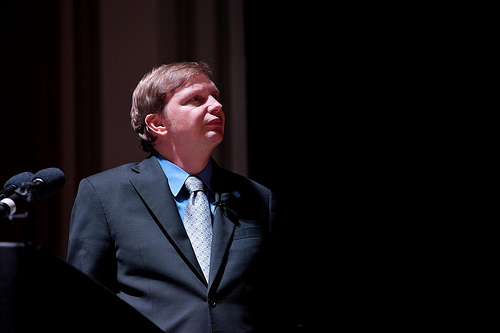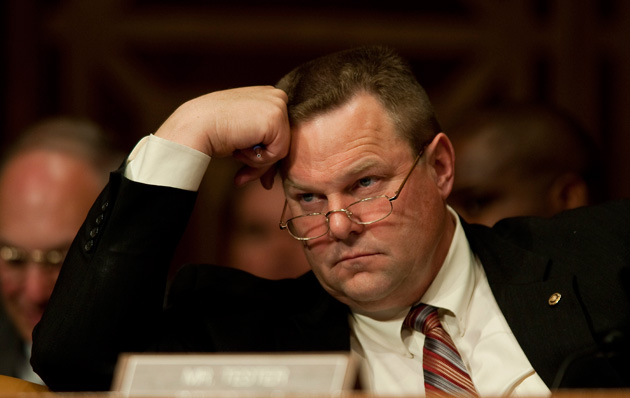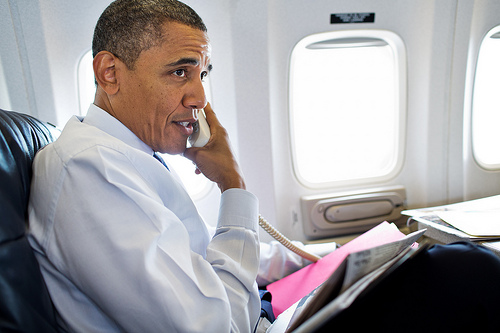
Jim Messina managed Obama's 2012 campaign and will now lead Organizing for Action, a post-election nonprofit backing Obama's second-term agenda.<a href="http://www.flickr.com/photos/barackobamadotcom/6921091869/sizes/m/in/photostream/">Barack Obama</a>/Flickr
Barack Obama’s 2012 campaign was the most technologically advanced political operation in American history, a techie’s wet dream. The campaign, led by Jim Messina, amassed and distilled vast quantities of voter data, built apps and networks to mobilize voters and enlist volunteers, and practically perfected the science of email fundraising. Post-election, Messina and his lieutenants weren’t about to let their data files, email lists, algorithms, and grassroots machine simply gather dust. Instead, they will soon launch Organizing for Action, a standalone advocacy group created to bolster Obama as he pursues his second-term agenda. Messina wrote in an email to donors and staffers that the new group “will be a supporter-driven organization, as we’ve always been, staying true to our core principles: ‘respect, empower, include.'”
But there’s a rub: Organizing for Action will be formed under section 501(c)(4) of the tax code, and will not be required to disclose its donors. (The Los Angeles Times first reported this.) For context, Karl Rove’s dark-money juggernaut, Crossroads GPS, is a 501(c)(4), as is the Koch-backed national conservative group Americans for Prosperity. The decision to make Organizing for Action a dark-money nonprofit makes sense strategy-wise: as a nonprofit the new group can meet and coordinate with members of the Obama White House, which it couldn’t do as a super-PAC. But the decision flies in the face of Obama and the Democrats’ supposed commitment to transparency.
Obama has pledged to make his administration the most transparent in history. His reelection campaign also took steps to be open to the public, including the admirable move of disclosing all its super-fundraisers, or “bundlers,” each quarter, which it didn’t have to do. (Mitt Romney’s campaign did not name its bundlers.) But going the dark-money route leaves Organizing for America vulnerable to criticism. “It’s the right vehicle from a legal perspective, but it is breathtakingly hypocritical,” says Charles Spies, a Republican lawyer who ran the pro-Romney super-PAC Restore Our Future.
The new group will be used to mobilize Obama supporters around the key issues of Obama’s second term in office. Those issues include battles over raising the debt ceiling, gun control, and immigration reform. Alums of Obama’s 2008 campaign launched a similar post-election effort called Organizing for America, but it had little impact, especially on the defining policy fight of Obama’s first term, health-care reform.
Organizing for Action, the post-2012 project, will accept individual and corporate contributions, according to the Associated Press, but not money from lobbyists or political action committees. (That said, Team Obama has found ways to sidestep earlier restrictions on interacting with lobbyists.) The new group, which will be separate from the Democratic National Committee, claims it will voluntarily disclose its donors even though it is not legally required to do so.
That’s well and good—if it follows through with the disclosure pledge. But even then, Organizing for Action will be far less transparent than a super-PAC. Super-PACs can raise and spend unlimited amounts of money, but they must disclose all donations and all spending in a timely way. The type of nonprofit Organizing for Action wants to become is not required to disclose its spending in a timely way—it will detail its spending in IRS filings made available many months after the fact. And it’s unclear how often the group will release the names of its donors. Monthly? Quarterly? Annually?
Organizing for Action could, if it wanted, go above and beyond what the law requires by disclosing its donors and spending in real time. For now, it remains to be seen whether the new group will live up to the president’s transparency promises.
















